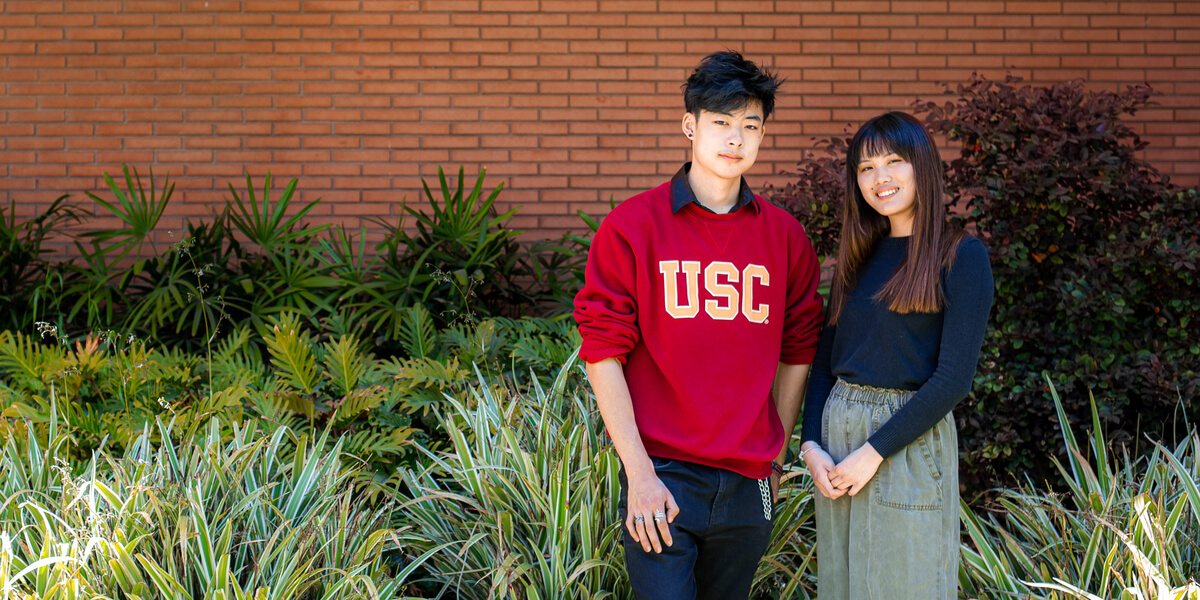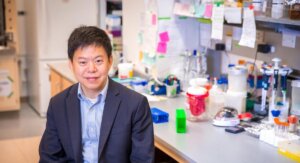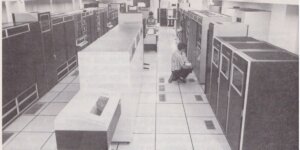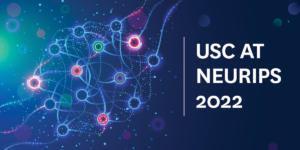
Juniors Allen Chang and Jordan Cahoon were awarded both the 2023 Goldwater Scholarship. Photo/Emilia Doda.
Two USC computer science students, Jordan Cahoon and Allen Chang, have been named 2023 Goldwater Scholars, a program honoring Senator Barry Goldwater designed to “encourage outstanding students to pursue research careers.” This year, 413 college students were selected from 1,267 nominees nationwide.
Jordan Cahoon is a junior majoring in computer science at USC Viterbi and minoring in computational biology and bioinformatics at the USC Dornsife College of Letters, Arts and Sciences. She began her journey into computer science during her senior year of high school when she accepted a research position at an immunology wet lab. However, when the pandemic hit in early 2020, her in-person research came to a halt.
“My principal investigator offered me an alternative project analyzing sequencing data and encouraged me to learn how to code to stay involved in our research,” Cahoon said. “Through this experience, I discovered I enjoyed programming, and I became increasingly interested in computational methods to analyze genetic and genomic data.”
Cahoon chose USC in part for the plentiful undergraduate research opportunities, quickly getting involved in a variety of projects that apply computer science to public health issues.
She is currently an undergraduate researcher at the Chiang Lab at the Keck School of Medicine’s Center of Genetic Epidemiology. Most recently, she was part of a team that analyzed how historical biases toward European individuals in genetic sequencing data decreased the performance of a critical genetic studies tool, called imputation, for non-European populations.
“My work will help researchers outline the current weaknesses in imputation to help improve the study of underrepresented populations in genetic research,” Cahoon said. “In the future, I want to develop computational tools that will facilitate the study of diverse populations and help make human genetics research more equitable.”
Born and raised in Kent, Washington, a hub for the region’s immigrant and refugee communities, Cahoon said it is vital that her research benefits underrepresented individuals in medical research.
“Being a successful scientist is very important to me because I want to give back to the community that helped raise me into the person I am today,” said Cahoon, whose high school student body spoke 132 different languages. “Because I grew up around people who felt disenfranchised by medicine and science, I think it’s incredibly important for me to conduct equitable research that has tangible benefits for communities like the one I grew up in.”
After graduation, Cahoon hopes to pursue a PhD in genetics or computational biology.
Allen Chang is a junior double majoring in computer science at USC Viterbi and applied and computational mathematics at USC Dornsife. Originally from Silicon Valley, Chang saw how computer science could be used as a tool for creativity and innovation, and he wanted to pursue research for similar reasons.
“My motivation lies in developing machines that are more adaptable and responsive to human needs, ensuring efficient collaboration and safety in future AI and machine technologies,” Chang said.
Chang began studying human-computer interaction during his freshman year at USC in Professor Maja Matarić’s Interaction Lab, where he focuses on helping machines better recognize human behavior during human-robot interactions.
“The data from human-robot interactions can be limited and unclear, making it difficult for machine learning models to accurately interpret human emotions, instructions, or intentions,” Chang said. “Additionally, models can develop biases due to uneven or mislabeled training data. My work involves developing models to identify and predict human behaviors and instructions, as well as exploring computational methods to identify and mitigate model biases.”
Chang’s extensive research experience also includes behavioral modeling for human-computer interaction in Assistant Professor Jesse Thomason’s GLAMOR Lab and Assistant Professor Stefanos Nikolaidis’ ICAROS Lab. Throughout these opportunities, Chang has used machine learning to work towards a common goal: to enhance adaptability, explainability and safety in human-computer interaction.
In the future, he plans to pursue a PhD in computer science and contribute to the advancement of multimodal behavioral computing.
Both students are the co-presidents of CAIS++, the student branch of USC’s Center for Artificial Intelligence in Society (CAIS). Since the club’s founding in 2017, four of USC’s Goldwater Scholars have been a part of CAIS++ in some capacity. Both students have mentored and connected with other undergraduate students at USC interested in machine learning and have also conducted research through the organization themselves.
“Currently, I am working on a project through CAIS++ where we are developing a model that will detect stressful events in healthcare settings,” Cahoon said. “We hope this research will help hospital administration circumvent health worker burnout.”
Both Cahoon and Chang agreed that USC has provided them with valuable resources and connections for their research careers, allowing them to not just pursue research, but do so at an advanced level, even as undergraduate students.
“USC has played a pivotal role in shaping my research journey,” Chang said. “Being immersed in this vibrant and talented community has opened doors to incredible opportunities.”
Published on April 28th, 2023
Last updated on May 3rd, 2023













